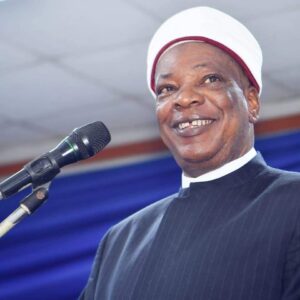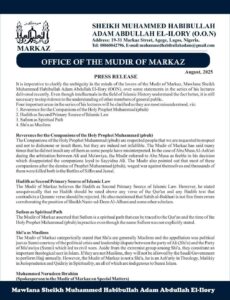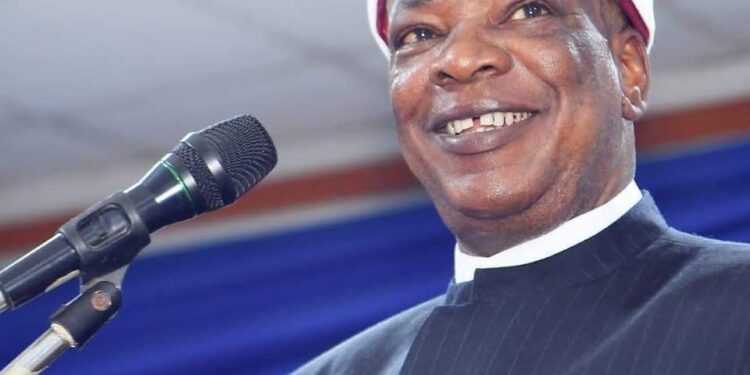
By Ibrahim Kegbegbe
Lagos, Nigeria – 27 August, 2025
LAGOS – The Mudir of Markaz, Mawlana Sheikh Muhammed Habibullah Adam Abdullah El-Ilory (OON), has addressed what he described as “misunderstandings” arising from his recent series of lectures on Islamic history and jurisprudence.
In a statement released by his office in Agege, Lagos, the Islamic scholar said that although specialists in the field of Islamic studies may have understood his positions, many members of the public appeared to have misinterpreted them.

The clarification covered four key areas: the reverence of the Companions of the Prophet Muhammad (pbuh), the place of Hadith in Islamic law, the role of Sufism, and the status of Shi’a within the Muslim community.
On the Companions of the Prophet Muhammad (pbuh):
Sheikh El-Ilory reiterated that while the Companions are deserving of respect, they were not infallible. He dismissed claims that he had insulted them, explaining that his remarks about Abu Musa Al-Ash’ari’s arbitration decision during the conflict between Ali and Mu’awiya were historical observations, not derogations. He further noted that many companions fought against each other in the Battles of Siffin and Jamal, which led to heavy casualties.
On Hadith as a Source of Law:
The scholar reaffirmed his belief in Hadith as the second primary source of Islamic law after the Qur’an. However, he emphasised that no Hadith should override a Qur’anic verse. He added that even highly regarded compilations such as Sahih al-Bukhari are not entirely free from errors, echoing the views of scholars like Sheikh Nasir-ud-Deen Al-Albani.
On Sufism:
Sheikh El-Ilory maintained that Sufism represents a legitimate spiritual path rooted in the Qur’an and the practices of the Prophet Muhammad (pbuh), despite the term itself not being explicitly mentioned in early Islamic texts.
READ ALSO:NBTE Approves Markaz for Legal Studies, Offers National Diplomas in Combined and Common Law
On Shi’a Muslims:
The Mudir stressed that Shi’a are Muslims and that the appellations “Shi’a” and “Sunni” were political in origin, stemming from disputes over leadership after the Prophet’s death. He noted that aside from extremist groups, Shi’a communities remain part of the wider Islamic fold. He also pointed out that their annual participation in the Hajj pilgrimage under Saudi approval underscores their recognition as Muslims.
READ ALSO:Markaz Ramadan Lecture: The Only Place Where Extremism Has No Breeding Ground
Sheikh El-Ilory concluded by affirming his own theological identity as an Ash’ari in creed, a Maliki in jurisprudence, and a Qadiri in spirituality—all firmly within the Sunni tradition.
READ ALSO:Ganduje’s Visit Quashes APC Rift Rumours, Shows Party Unity
The statement was issued by Muhammed Nurudeen Ibrahim, spokesperson to the Mudir of Markaz on special matters.
















